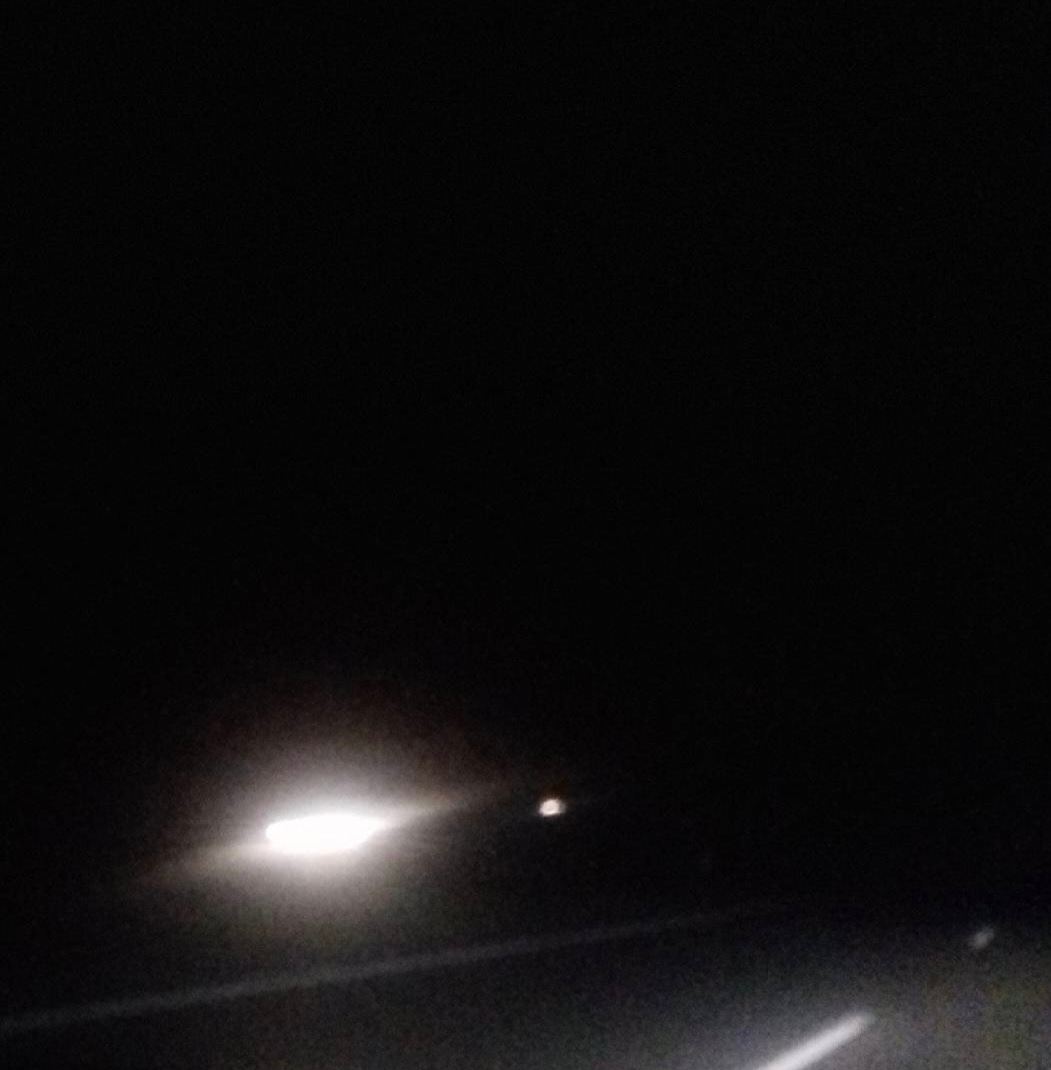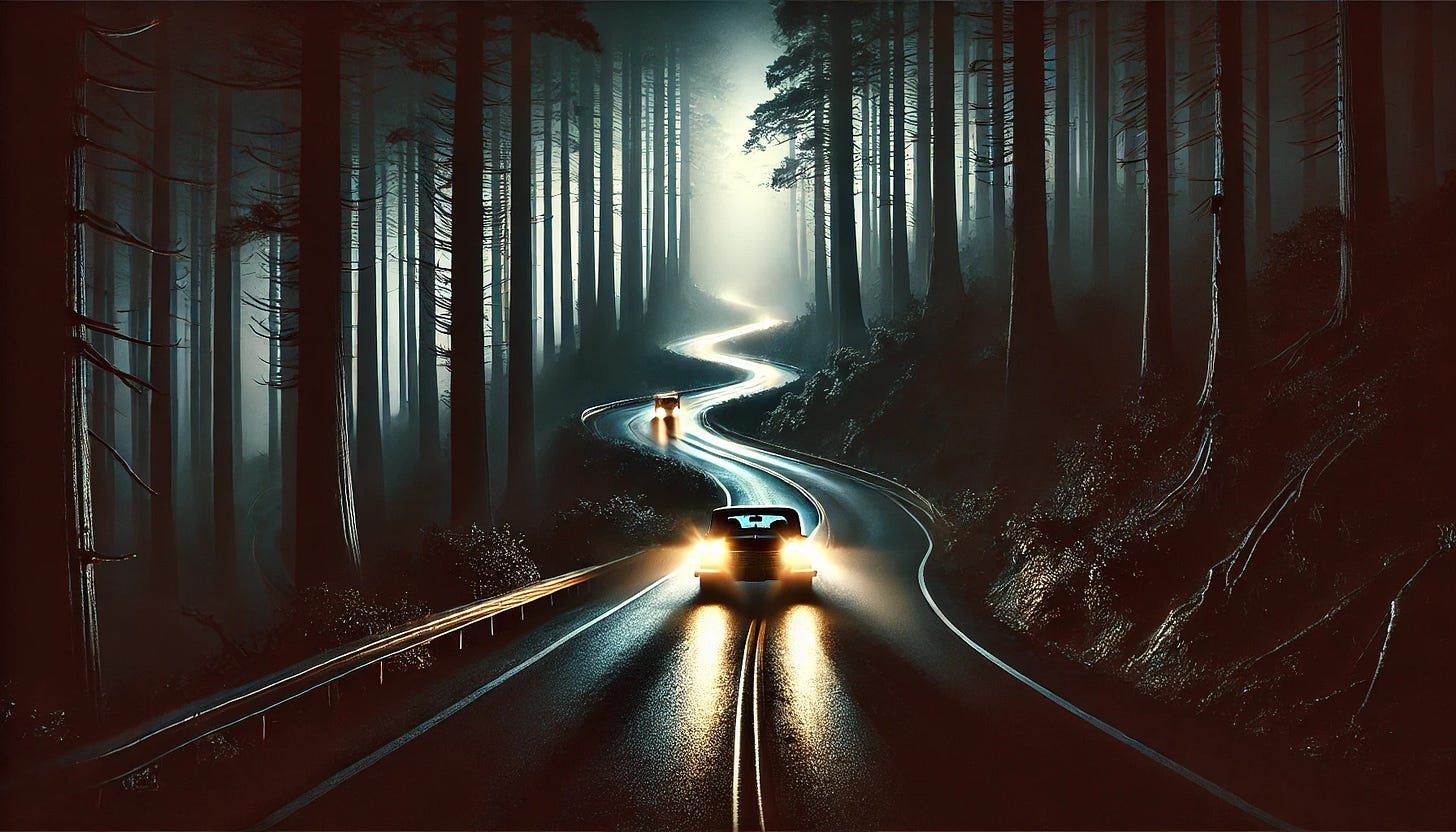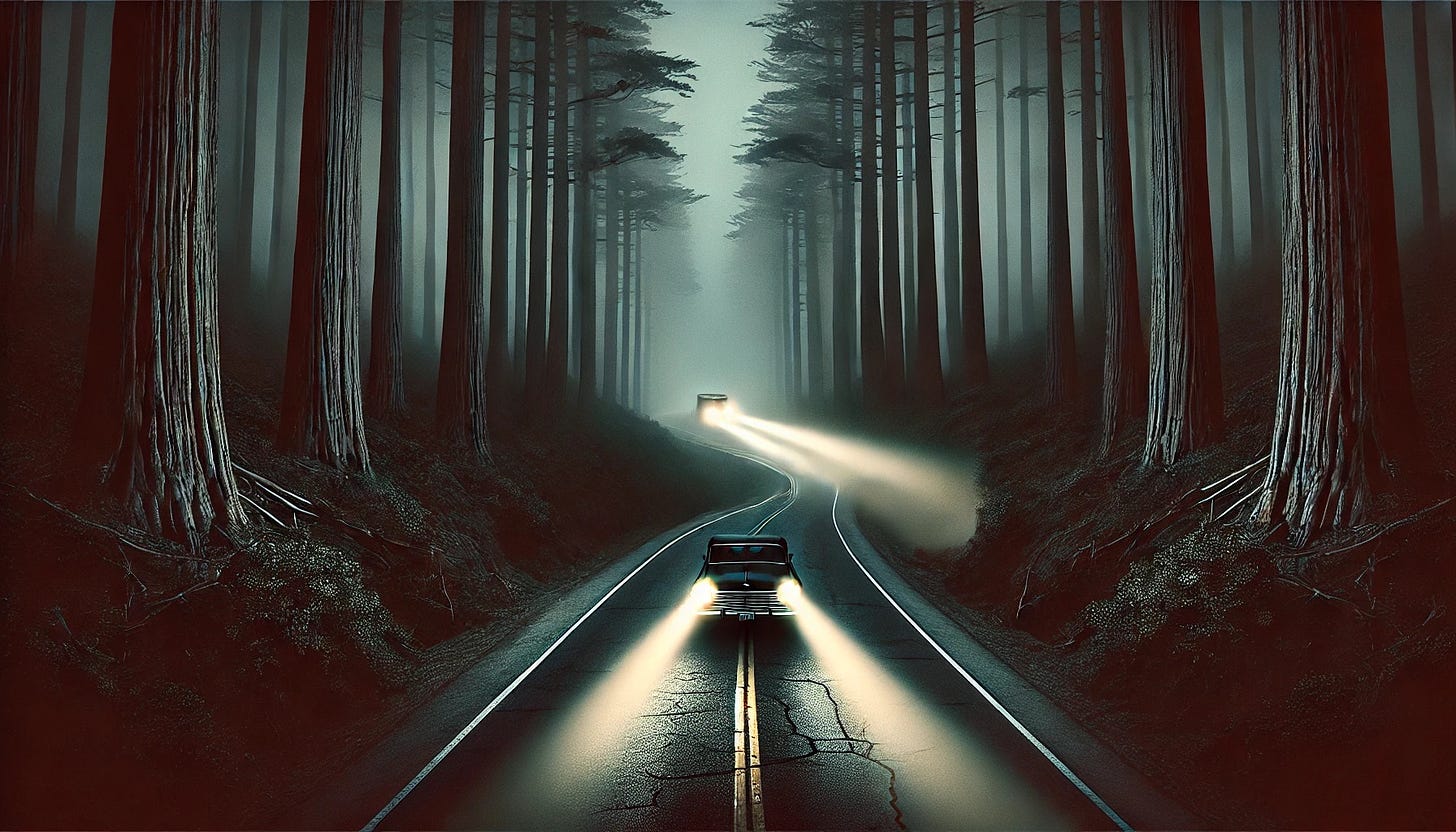Detour
A tale torn from the road
From a conversation I once had, I don’t know with whom, how, or under what circumstances, I came up with this definition of a true friend as someone who will come to pick us up, in the dead of night, on a deserted road if our car breaks down and we're left stranded there, at night, in the middle of nowhere. I think about this sometimes. It's a thought that likes to announce itself whenever the right circumstance appears. I enjoy discussing it: speculating, disagreeing, learning from examples, accompanying us through its ups and downs. See it as a good exercise. Not seriously, otherwise it becomes a bit unhealthy, dangerous, even absurd.
Come on. It may not be just friends who will come to our rescue. Once we overcome the barrier of distrust and paranoia, there are those who have some solidarity, or even a missionary spirit, with a strong desire to help. Or for those who see things from the perspective of karma, that balance between giving and receiving, a little Karma Yoga could never hurt anyone. Others will do it out of love for the other and not so much from fear — some even with a keen conviction that we cannot give in to fear. Others, absurd or not, believe it's better to regret something we've done than to regret something left undone. So here we go.
Any of these examples may not be our friend — at least in the present. In the future, who knows? And friends? Well, not all friends are necessarily good people, and I'd better stop there. Neither friends nor good people are necessarily altruistic. So better stop here, too.
Speaking of myself, I have this obsession with lost roads into the endless nights of the Iberian Peninsula. I've been stuck, yes, of course. Called anyone? Nah, I've never called. As a lone wolf, I've always found a way, whether leaving on foot or waiting for daylight and call my insurance company. I've never really been afraid.
When it comes to lost roads through the night, I have my own, there in the Alentejo province, near Grândola, a little over 100 kilometers from Lisbon. It's not even signposted. We're on the road to Sines, and we feel like getting off that straight line, one-way traffic, where reckless overtaking happens every twenty seconds, and in the liminal world of our thoughts, the expression ‘Oh Jesus’ is the one most often heard, some sort of a collective chorus of ‘soon we’ll be gone from this world,’ as people like to say. There were nights when we were already exhausted, especially on our way back to Lisbon after a full weekend — at the beach in summer, strolling, eating and drinking, or simply reading, watching movies, or doing nothing at all. Everything was great back then in Vila Nova de Milfontes.
In any case, by the time Sunday night rolled around, I was already filled with the anguish and worries of the week ahead. I reached the 25 de Abril Bridge, and those metallic noises from the central deck—noises that had caused me so many fears and nightmares as a child—were like the soundtrack of my own stress. If two days earlier, arriving in the south, it would usually take me three minutes to acclimate—basically, you know the drill: getting the car keys out after parking, carrying my luggage home, that sort of thing.
But in Lisbon it took me three days, sometimes more, far beyond the simple ritual of parking, taking out the keys, carrying my luggage home. My only way to deal with it was to really push things forward. Even somewhat forcefully pushing my existence into what I thought it had to be. It was the only way to feel less anguish, less worry and less fear. Indirectly causing stress to others, of course, but that's another tale, for another time, maybe.
There’s that famous quote from Stephen King in his On Writing where he says that the scariest part is just before you start, as if just starting were enough to solve the problem. There was nothing like that here. Possibly because hell was something else—or other people, as Jean-Paul Sartre would say—and also because it dragged on for three days, if not more.
Let's face it, even in writing, there are many problems with this advice. The biggest one, really, is that it can only be seen by those who are afraid of writing or people whose lives don't quite work out and who sit down at those times, write and edit, then finish. People who have everything under control. More or less advice, the only thing I take for granted here is the writing itself. The ball—we should never take our eyes off the ball. In football, soccer if you like, handball, basketball, and, of course, writing.
Since I was driving, let’s change it to motorsports: never take your eyes off the track. The scariest moment? Come on! We can start writing and then even take a nap, without losing our way. Quite the contrary: we gain more discernment, a sharper sense of direction. Writing is like driving on a clear road: we let it flow, no problem; we can be immersed in the plot, even constellate the characters’ dramas, we have fifty lives and can even slam on the brakes and stop in the middle of the road.
Editing is another kind of animal, though. Some paragraphs may need seven hours of sleep before I can finish them. The great Portuguese writer, José Cardoso Pires, used to say that he needed more than a typewriter was a cutting machine1. Nelson de Matos— his editor and close friend — once surprised him spending an entire morning working around a single paragraph.
I don’t know Cardoso Pires’s sleeping habits, but David Mamet can use a nap every day while working on his writing. I’m even more pleased to know that it was a common method with David Foster Wallace. Why don’t more writers admit this? They’re probably superhuman. For my part, I can’t find a better way to edit a text or a poem than with a fresh eye, the mind working at maximum force and speed, that’s super great and productive. To solve a puzzle as if nothing were happening; to transform a story about to be thrown away. To take some notes and give them a rehearsal. The brain’s running like a Formula 1, pushing hard, hard, hard, until the head turns to mush and you have to close your eyes for a little while longer and go to another nap. It’s a miracle cure.
That night, however, there would be no chance of falling asleep. I was deep in a nightmare.
You think it only happens in the movies. That this sort of thing cannot be real. It is all fun and games until you have a car right up against your bumper, headlights on full blast. You can't brake, quite the contrary, you accelerate hard. You leave the other car behind, to see if it would work. But no way: soon it would come right up to you again, the beam of its headlights cutting through the rearview mirror.
Once, twice, three, four, until you stop counting. You're left with the idea that it never ends. Like that road. It never ends, and more and more, it approaches a worrying certainty.
I'd be lying if I said that at first I gave it much thought. I didn't. I thought he was just another prankster. Someone who had nothing better to do. As had happened to me many times before, in a matter of minutes, it would all amount to nothing more than a misunderstanding. Yes, based on my experience, I thought it would pass. It was only a matter of time. There are many crazy people. It was nothing.
But the minutes passed, and that idea disappeared. I accelerate, the car behind accelerates. I'm going fifty kilometers per hour, the car behind me is going fifty. I accelerate to 150, the car behind me accelerates to 150. A certain sense of déjà vu enters my mind: where have I seen this before? I know: the movie Duel… by Bruce Springsteen?
Duel by Bruce Springsteen? — the high beams in the rear, very close, seemed to ask me in a mocking voice: Bruce Springsteen? Steven Spielberg! Steven Spielberg, man! Yes! Steven Spielberg. But it wasn't just Duel, it was also Close Encounters of the Third Kind. There was a strange, alien atmosphere there. And the worst part was that I had already started reading Jacques Vallée. Those liminal places, interdimensional beings… I didn't want to think about it.
There was nothing to think about. The road pierced the space of a mountain range. It was curves and more curves, curve after curve. There were no straight lines. Sometimes I'd turn smoothly, other times jerkily, like a cutback in surfing, pulling the board up at a 90-degree angle... It wasn't worth it. The bastard could mimic my every move. If I eased up, he eased up; if I accelerated, he accelerated. More than once, I accelerated hard and let him pass me. No way. Never. Just another reason to stick to my bumper.
I began to think there was a killer there. Worse: a psychopath. Someone trying to cause terror, at best, and having fun with it. If I’d known it was the latter, I might even have enjoyed it. But that wasn’t possible. I'd stopped alternating between high and low speeds. All I could do was keep the pedal to the floor. I still don't know how I didn't throw myself off a cliff. My secret hope was that the pursuer would crash—that, yes, would have been fun.
Even more disturbing was the endless time, as if it would never stop. That stretch of road could never have been more than twenty kilometers long… well, thirty, forty at most. I had the feeling I’d entered halfway down the road. Since the distance between Sines and Grândola is fifty kilometers, I was already in a space-time warp. Or, more seriously, I could have already crossed the border, already been in Spain. There was no end to it. On a road without light, only the beam of my headlights against the darkness, reminding me of the Hermit tarot card. And that bastard with headlights on full blast, casting this unreal light into the interior of my vehicle. Was all that human?
Now we return to Jacques Vallée, liminal spaces, interdimensional beings. The worst part is that I had also been reading John Keel. This is worse than being obsessed with Hitchcock’s The Birds and then suddenly finding myself alone in the middle of a swarm of seagulls. And then, when I least believed it—when I had completely surrendered to terror, convinced I was facing annihilation, certain that if I wasn’t murdered I’d be abducted—I saw it: a sign: LISBOA—157 km.
Of the pursuer, that sort of duelist of the threshold, there was nothing. Not in the rearview mirror. Nor even when I risked a crash to look back. No presence, as if it had vanished from nothingness into nothingness, as if it had never been more than a hallucination or a hallucinatory drug that had worn off.
I felt happier than I had ever been. Relieved, as if seeing a missing son come home. Or as if I had escaped an incurable disease. I didn't feel stupid for the fear I'd felt. What had happened, had happened. And what hadn't happened was even better. Being alive to write this. Being alive, with no thought of the week ahead. That served as a warning for a long time: you never know.
What I've never been able to do again is go back down that road. My nerves overwhelm me every time I approach that turnoff. When it's behind me, a shiver of relief runs down my spine.
—In Portuguese, máquina de escrever literally translates as “writing machine.” Cardoso Pires quipped that what he needed even more than a máquina de escrever (“writing machine,” i.e., typewriter) was a máquina de cortar—literally, a “cutting machine.”




